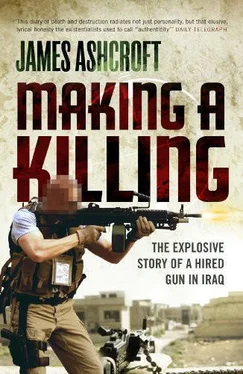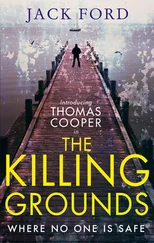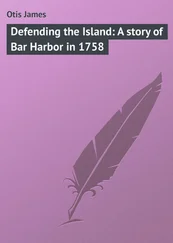Private companies, security firms (including Spartan), NGOs and the press had their offices in the Green Zone. Bizarrely, there was a residential area where the Iraqis who had been living there before the war had remained. They worked as cleaners, translators and drivers and the Americans didn’t appear to find anything unusual in this even though access for all other Iraqis was heavily restricted.
Saddam’s palaces were not architectural jewels but fortified bunkers built to withstand bombardment. Ideal for the CPA. The buildings boasted a few arched windows and ornamental minarets, but the extravagance was saved for the interior where everything was made of marble, velvet and gilt. There were enormous carved eagles perched on tall columns and chandeliers from Paris. The bathroom fixtures were marble and gilded monstrosities. The palaces now billeted grunts from the 3rd Infantry. They were sleeping in cots in Saddam’s bedroom and pissing in Saddam’s golden urinal. The fleeing government officials and local looters had taken the Ming vases, the Picassos and Monets, the gold-leafed sofas, the gold-rimmed mirrors, and tasteful items would sometimes turn up in a breeze-block hut with a tin roof, like an installation by a conceptual artist.
Everyone would have liked to have taken a piece of treasure home but by the time I arrived the palaces had been picked clean. One lunchtime I came across a copy of the Stars and Stripes with a photo of three guys who had found $15 million in suitcases. They were all clean-cut American boys and they’d given the money back. I showed Sammy the newspaper. He knew where the Ba’athist officials had their villas outside the zone and we agreed when we had some free time we’d take a look.
We did find one big old villa, a shell, clean as bone, and I took photos of the garden from the roof to see if the ground had subsided over any hastily buried caches. We never discovered those telltale signs, but Sammy and I enjoyed the fantasy.
In the last week of Delacroix’s tour of Baghdad, his agency cancelled the PSD contract. Bearing in mind that Spartan’s standard charge was $1,000 per day, per man in the guard team, Spartan had effectively lost $42,000.
Our boss, Adam Pascoe, therefore, made an effort to get Spartan more secure deals from the CPA. When he scored the contract to PSD Colonel John Hind it was like opening an untapped seam in a gold mine.
At first glance private security may have appeared expensive, but when the US Government calculated that it was spending $25,000 per soldier per month in Iraq, then using private contractors was in fact more cost effective. They are paid to carry out specific defined tasks, and once the contract is completed, the costs end immediately.
On 13 December 2003, three months after my arrival in Iraq and eight months after the end of the war, Saddam was found burrowed in an eight-foot hole in Tikrit, his old stamping ground in the heart of the treacherous Sunni Triangle. Some 600 soldiers of the 1st Brigade of the 4th Infantry Division with special operations forces of Task Force 121 had carried out the raid in Ad Dawr and had found Saddam’s bunker near a group of ramshackle buildings. Saddam had a scruffy beard and a pistol. He didn’t fire a shot and emerged from his hole a broken maniac suffering the shock and awe of having been drugged by his own bodyguards.
Most Iraqis had hated Saddam. They enjoyed seeing his humiliation on television, but it was a tipping point, a reminder that thousands of Iraqis had died in the bombing and during the occupation life wasn’t getting better, it was growing worse. Electrical goods were flooding over the frontier, but there were now fewer hours of electricity in which to use them; there were shortages of food, gasoline and medical supplies. Every day that I had been in Baghdad the number of attacks on Coalition Forces had risen. The response by US troops was often heavy-handed and resentment from ordinary Iraqis resulted in a lack of co-operation at best, and at worst more volunteers for the uprising. Privatising security was clearly making a lot of sense in the White House. In December 2003, more than a thousand American soldiers had made use of the boxes piled up at Camp Victory and had gone home draped in the flag; more than 2,300 by April 2006. Americans didn’t like that. It was upsetting when they tuned into the evening news. The Administration started bringing the boys home at night in secret, but their buddies got photographs and leaked them to the press. They had fought for the streets of Baghdad with these guys. They were heroes. By outsourcing security, the US could avoid unfavourable headlines in the press. Busy fighting the propaganda war, spokesmen were rebranding Shock and Awe as Operation Iraqi Freedom.
‘I remember Operation Angola Freedom,’ Etienne said over his roast lamb one night. ‘I lost a lot of mates in that war.’
‘When they say freedom, it means it’s going to be a long battle,’ added Cobus.
‘ Gut . Gut . I can pay off my bond,’ said Hendriks, practical as always.
Colonel John Hind was in his late forties, a guy who had been fit but was now going to pot, with a ruddy face, fair hair that was almost white and eyes hidden by wraparound shades that could have belonged to Bono. He had been put in charge of Task Force Fountain and had come to I-raq with the objective of scoring his one-star: promotion to general. As the American boss of water resource protection he had moved into the CPA expecting to have a plush office and fifty Marines in support. What he got was a box room without so much as a gold-plated urinal and a sergeant to do the typing.
I felt sorry for Hind. I had seen a few officers in the Dukes who craved promotion and it’s not a pretty sight. It’s like trying to upstage other actors in the theatre; the kind of officers, as Krista had astutely observed, who speak louder than anyone else at dinner parties and then write thank-you notes that are all hype and no heart.
Hind had persuaded the general staff at the CPA that he needed to get out and see the water. Swinging the budget to get himself a PSD team had been a coup. Now we had that job, we were hoping to get Spartan more contracts with him as the project commanding officer. More kudos to John, more money for Spartan.
The military command at the CPA was under pressure to make the post-war reconstruction in Iraq a media success. Hind in his quest for promotion was working on getting a reputation as a can-do guy and volunteered his expertise in situations where no one was sure what had to be done and who exactly was responsible.
His favourite task was taking us on a water inspection jaunt where, sometimes, we would run into a convoy of materials for the reconstruction coming in from Jordan or Kuwait. He would insist on accompanying the convoy and, as his PSD team, we would find ourselves acting as de facto convoy escorts.
I told him that it wasn’t our job and if the trucks came under fire, we would whisk him off to safety and bugger the convoy.
Convoys brought in everything from sewer pipes to dumper trucks, from loo rolls to portaloos, from M&M’s to sandbags. Convoys came in many sizes; a hundred trucks wasn’t unusual. These were protected by the US military, often in conjunction with security firms that had scored those juicy escort contracts. Smaller convoys from lesser reconstruction outfits than KBR would take their chances with drivers from Egypt, Nepal and the Philippines who were risking their lives to make the sort of money they could never even dream of earning at home. These motley caravans were magnets to insurgents and looters alike. The Americans didn’t like losing these vehicles and John Hind was trying to expand his influence by saying he could provide cover. By he , he meant us . I told him to bugger off.
Читать дальше












